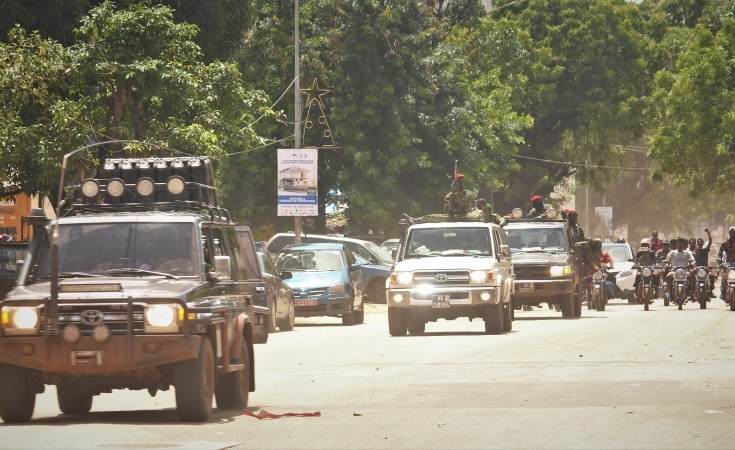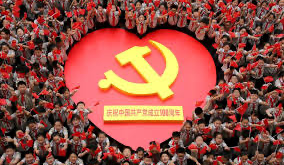OPINIONBy Mutuma Mathiu

A military parade in Conakry on September 6, 2021, the day after a military coup in the country.
Aboubacarkhoraa / Wikimedia Commons
“Guinea is beautiful. We don’t need to rape Guinea any more, we just need to make love to her.”
With those carnal words on Guinean TV at 2pm on a Sunday, no less, Lieutenant Colonel Mamady Doumbouya a week ago announced that he was basically taking that country on a new nightmare of fatigues, dark glasses, army gloves, knee holsters, a broad row of cheap medals and, most likely, the kind of barracks buffoonery that hasn’t been seen since Yahya Jammeh lifted his extravagant robes, hoisted tail and fled The Gambia for Equatorial Guinea, where he was given refuge by President Obiang Nguema Mbasogo.
Mr Mbasogo is himself a story all on himself, with hints of a Bugatti-owning, Switzerland-living, Hollywood-frequenting wasteful son and dashes of witchcraft and the old cannibalism.
The story of how Mr Doumbouya wormed his way into President Alpha Conde’s circle, earned his trust and plotted to overthrow him shows a certain competence that does not bode well for democracy in that country.
The fact that the opposition, led by Cellou Dalein Diallo, are lining up to join a government formed by the coup plotters is also a very bad omen. I have pieced together this article from other reporting, and especially The Africa report, which is available online by subscription for readers who are interested in the raw detail.
Established a private army
But let me start in the beginning.
President Conde served his two lawful terms and plotted to change the constitution to give himself more time in power, as all African leaders dream of doing. To ensure that he suppressed dissent in going for the illegal third term, President Conde basically established a private army, the Special Forces Group, better trained and better kitted than the regular Guinean military.
Col Doumbouya may be of Guinean origin, but he is a French national, married to a French police woman, trained at the War College in Paris (École de Guerre) and serving in the French Foreign Legion, part of the French army. Within 24 hours of announcing his coup, arresting the President and holding him incommunicado, Mr Doumbouya called the government he had deposed for a meeting – the Prime minister, the Defence Minister, the police and military bosses, everyone was expected to attend.
Failure to attend would be considered rebellion, they were warned, according to The Africa Report. On the one hand he promised that if they cooperated, they would not be harmed, bygones will be bygones. On the other, they were taken into custody, their passports confiscated. They are totally in Mr Doumbouya’s power now.
The new strongman returned to Guinea three years ago and was appointed to head Mr Conde’s special forces. The force grew quickly from an initial 200 strong to 500. Last year, it asked to set up headquarters in one wing of State House, called the People’s Palace and close to the defence ministry.
Mr Conde, who was quite enamoured with the coup plotter and trusted him above all others, agreed. But from the stuff I have been reading in The Africa Report, others were not so quick to trust “the foreigner” and did not embrace Mr Doumbouya as tightly as the President did. As a matter of fact, their view appeared to prevail and the President was in the process forming another military unit to rival the special forces.
But then that is all moot now. Mr Doumbouya timed and moved with precision.
No country deserves the embarrassment of being led by these types of folks. But Conde betrayed his country by changing the constitution to give himself more years in power. So did Allasane Ouattara and many other African despots. The truth of the matter is that many small Africa countries are also vulnerable to coups originating from all manner of places.
British profiteers
There used to be a mercenary called Bob Denard who specialised in taking over countries. Many will also remember the so-called Wonga coup in 2004 in which British profiteers, funded by well-connected people such Sir Mark Thatcher, son of former Prime Minister Margaret Thatcher, plotted to overthrow the government of Mr Mbasogo and install in his place Severo Moto as the ruler of oil-rich Equatorial Guinea.
The whole thing was scuttled by Robert Mugabe when the Zimbabweans intercepted a plane carrying arms and 64 mercenaries from South Africa.
Guinea is not poor. It has iron ore, gold, diamonds and the world’s biggest deposits of bauxite. As a matter of fact, it supplies quarter of the word’s bauxite, used in the manufacture of aluminium, a very valuable metal on the manufacture of many items.
Mr Doumbouya went out of his way not to inconvenience mining interests and production continued throughout the coup: he lifted a curfew on mining areas and kept maritime borders open to facilitate the extraction of minerals to markets abroad.
I don’t know whether Mr Doumbouya is the Severo Moto of Guinea. What I do know is that he cannot be allowed to rule that country, whether he considers it making love to it or raping it or whatever other inappropriate image he chooses to employ.
It is bad enough that the coups in Chad and Mali were allowed to stand and the coup plotters exercise power which they do not deserve.
The African Union is of no use if it cannot guarantee respect for the sovereign will of Africans. Combined, it has a bigger, stronger army than Mr Doumbouya. Why can’t it tell Mr Doumbouya to take his dark glasses and disappear back into the French Foreign Legion?
Allafrica.com
 Africa -China Review Africa -China Cooperation and Transformation
Africa -China Review Africa -China Cooperation and Transformation
